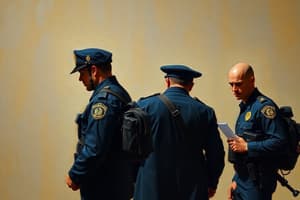Podcast
Questions and Answers
What must be communicated to a person at the time of arrest to ensure it is lawful?
What must be communicated to a person at the time of arrest to ensure it is lawful?
- The grounds for arrest. (correct)
- The identity of the arresting officer.
- The officer's identification and rank.
- The potential penalties for the alleged offence.
Which statement accurately describes a requirement for conducting an arrest?
Which statement accurately describes a requirement for conducting an arrest?
- Only the arresting officer needs to record the arrest circumstances.
- The arrest must be made only after a warrant is issued.
- The officer must mislead the suspect about the nature of the offence.
- The person must be informed of the nature of the offence and where it took place. (correct)
When can an arrest be deemed unlawful based on the timing of communication of reasons?
When can an arrest be deemed unlawful based on the timing of communication of reasons?
- If the arrest was not approved by a supervisor.
- If the reasons for the arrest are communicated after the arrest. (correct)
- If the reasons are complex and technical.
- If no one witnessed the arrest being made.
What should an officer do if a person cannot be cautioned immediately at the time of arrest?
What should an officer do if a person cannot be cautioned immediately at the time of arrest?
Which of the following must be recorded in the officer's pocketbook following an arrest?
Which of the following must be recorded in the officer's pocketbook following an arrest?
What is a potential reason for delaying the transfer of an arrested person to a police station?
What is a potential reason for delaying the transfer of an arrested person to a police station?
Under what circumstance can an individual be released without being charged?
Under what circumstance can an individual be released without being charged?
What does the term 'reasonable suspicion' reflect in the context of an arrest?
What does the term 'reasonable suspicion' reflect in the context of an arrest?
What criterion must be met for a person to be arrested based on a reasonable belief of imminent breach of the peace?
What criterion must be met for a person to be arrested based on a reasonable belief of imminent breach of the peace?
Under what circumstances can an arrest be made without a warrant for a breach of the peace?
Under what circumstances can an arrest be made without a warrant for a breach of the peace?
What is the definition of a breach of the peace?
What is the definition of a breach of the peace?
What is a key limitation regarding the power to arrest for apprehended breach of peace?
What is a key limitation regarding the power to arrest for apprehended breach of peace?
What is required for a magistrate to issue an arrest warrant?
What is required for a magistrate to issue an arrest warrant?
Which of the following is NOT a condition under which someone can be arrested for a breach of the peace?
Which of the following is NOT a condition under which someone can be arrested for a breach of the peace?
In cases of arrest where the person can be brought before a legal authority, what is the status of the arrest if the individual is released before formal charges?
In cases of arrest where the person can be brought before a legal authority, what is the status of the arrest if the individual is released before formal charges?
What must be demonstrated to justify preventive action against a potential breach of peace?
What must be demonstrated to justify preventive action against a potential breach of peace?
Which statement accurately reflects the concept of reasonable suspicion in relation to making an arrest?
Which statement accurately reflects the concept of reasonable suspicion in relation to making an arrest?
What characterizes the lawful use of force by police during an arrest?
What characterizes the lawful use of force by police during an arrest?
How can an arrest without a warrant be defined in the context of arresting for a breach of peace?
How can an arrest without a warrant be defined in the context of arresting for a breach of peace?
What constitutes the legal definition of an arrest?
What constitutes the legal definition of an arrest?
What can be inferred about the burden of proof concerning unlawful arrests?
What can be inferred about the burden of proof concerning unlawful arrests?
Under what condition can a police officer arrest a suspect despite a complainant withdrawing their complaint?
Under what condition can a police officer arrest a suspect despite a complainant withdrawing their complaint?
Which statement is true regarding unlawful imprisonment?
Which statement is true regarding unlawful imprisonment?
Which factor does not contribute to defining whether an arrest has occurred?
Which factor does not contribute to defining whether an arrest has occurred?
Under what condition can a constable release a person arrested without bail?
Under what condition can a constable release a person arrested without bail?
Which of the following scenarios justifies a police officer to arrest without a warrant?
Which of the following scenarios justifies a police officer to arrest without a warrant?
What is the primary test for whether an officer may arrest a person suspected of committing an offence?
What is the primary test for whether an officer may arrest a person suspected of committing an offence?
What is NOT a legitimate reason for the arrest of a person without a warrant?
What is NOT a legitimate reason for the arrest of a person without a warrant?
Civilians are allowed to arrest for which type of offences?
Civilians are allowed to arrest for which type of offences?
Which of the following best describes the common-law power of arrest for a breach of peace?
Which of the following best describes the common-law power of arrest for a breach of peace?
In what situation is a constable allowed to use force while making an arrest?
In what situation is a constable allowed to use force while making an arrest?
Which statement is true regarding the necessity of an arrest without a warrant?
Which statement is true regarding the necessity of an arrest without a warrant?
What must a constable have to reasonably suspect the existence of an offence?
What must a constable have to reasonably suspect the existence of an offence?
When is a constable permitted to use reasonable force while executing their powers?
When is a constable permitted to use reasonable force while executing their powers?
What factors determine the necessity and proportion of force used by a constable?
What factors determine the necessity and proportion of force used by a constable?
Which of the following is NOT included in the powers of arrest without a warrant by police?
Which of the following is NOT included in the powers of arrest without a warrant by police?
In what scenario can the use of excessive force still be considered lawful?
In what scenario can the use of excessive force still be considered lawful?
When are handcuffs justified for use on a suspect?
When are handcuffs justified for use on a suspect?
What governs police powers of arrest without a warrant regarding criminal offences?
What governs police powers of arrest without a warrant regarding criminal offences?
What constitutes a lawful arrest without warrant?
What constitutes a lawful arrest without warrant?
Flashcards are hidden until you start studying
Study Notes
Powers of Arrest
- Common law allows arrest without a warrant for breach of the peace.
- Police can arrest individuals for any offense without a warrant; civilians can only arrest for indictable offenses, such as rape, robbery, and serious bodily harm.
- Reasonable grounds for suspicion are required for an officer to effect an arrest.
Definition of Arrest
- Distinction between deprivation of liberty and restriction of movement is crucial.
- An arrest is not simply drawing attention unless there's intention to detain.
- Detaining without intention to arrest constitutes unlawful imprisonment.
Conditions for Communication of Arrest
- Individuals must be informed promptly that they are under arrest.
- The grounds for arrest need to be communicated clearly.
- Caution should be issued using accessible language, explaining the offense's nature and context.
Post-Arrest Protocol
- Arrested individuals must be taken to a designated police station; exceptions apply in urgent situations.
- If no valid grounds remain, the individual must be released.
- An arrest can be lawful even if followed by an immediate release before court appearance.
Breach of Peace
- Defined as potential harm to persons or property causing fear or actual disturbance (e.g., assault, riot).
- Preventive actions must be reasonable, necessary, and proportionate to an anticipated breach of the peace.
Arrest Warrants
- A justice can issue a warrant based on sworn written information about suspected offenses.
- Police can release arrested individuals on bail if necessary and proportionate.
Officers' Use of Force
- Officers may use reasonable force when exercising authorized powers (e.g., arrest, search).
- The necessity of force depends on the circumstances surrounding the arrest and potential risks involved.
Use of Handcuffs
- Handcuffs are to be used solely when necessary to prevent escape or violence.
- Unjustified use can lead to trespass but does not impact the legality of the arrest.
Powers of Arrest under PACE 1984
- Governed by section 24, providing guidelines for lawful arrests without a warrant, emphasizing reasonable grounds and necessity.
Studying That Suits You
Use AI to generate personalized quizzes and flashcards to suit your learning preferences.


